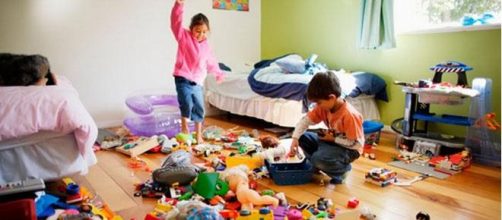YesterdayI went to the store with one major goal – to buy some boxes andcontainers for all that stuff we have in the bathroom, on the desksand – of course – in the playroom. I just felt so tired of themess that makes our apartment (which is, in fact, quite small forthree of us) even smaller. I gave away all the magazines I found butin 30 minutes two empty boxes were loaded again with books and mychild's pencils. That made me breathe again – less things werecovering tables and shelves.
Butthere is one zone I don't try to bring into order – my husband'sdesk.
Never. I tried once or twice a few years ago and saw thatclearness disorganizes him even more. So I thought: maybe, a mess isnot always as bad as my mom told me?
And itdefinitely isn't if you are a child or a creative worker. If you wantyour children to put away the toys they are not playing, you'll hear:“I'm not done playing!”. All those toy cars and animals lying ofthe floor are “on hold” waiting for your son or daughter to getback to play with them. Children cannot stay focused on one task fora long time – and that's normal for their age. Moreover, forcingthem to keep their room in order may even be harmful and slow downtheir development. The thing is that messy toys stimulate children'smemory and visual thinking – otherwise how can they find that verylion or tractor?
Ofcourse, there should be a line between mess and dirt: a child shouldunderstand that toys all around his or her room are fine but dirtydishes and dust are bad. If your boy or girl understands theimportance of keeping other rooms clean, just close the door when youfeel growing displeasure about a “messy” child's bedroom.
In 2013a group of researchers from the University of Minnesota published astudy which said: “Being in a messy room led to something thatfirms, industries, and societies want more of – creativity.Disorderly environments seem to inspire breaking free of tradition,which can produce fresh insights”. That was a conclusion from aseries of experiments. And the researchers also mentioned that “manycreative individuals with Nobel prizes and other ultra-prestigiousawards prefer — and in fact cultivate — messy environments as anaid to their work”.
Ofcourse, that won't do if you want to start a new life and acquire newhabits. So if you really want to start jogging or switch to ahealthier diet next Monday – clean up your space on Sunday. Andeven if you are currently working on a very creative project,bring your desk in order when you finish it. Researchers fromPrinceton University Neuroscience Institute say that permanentlyliving in cluttered rooms distracts you and makes you unfocusedwhich leads to frustration. And chronic mess may be a sign of depression - a reason to visit a doctor.
MarkHurst, the author of the book “Bit Literacy”, is sure thatdigital chaos (such as numerous open tabs in a browser or dozens oficons on a desktop) has the same impact on your productivity. As wellas a messy desk, it makes you unable to process and rememberinformation and switch between the tasks. And that has nothing to dowith creativity.

